Central African Republic: ‘suffering beyond imagination’
Tit-for-tat killings, rape, refugees – the Central African Republic has been described as “on the brink of genocide”, so should the international community intervene?
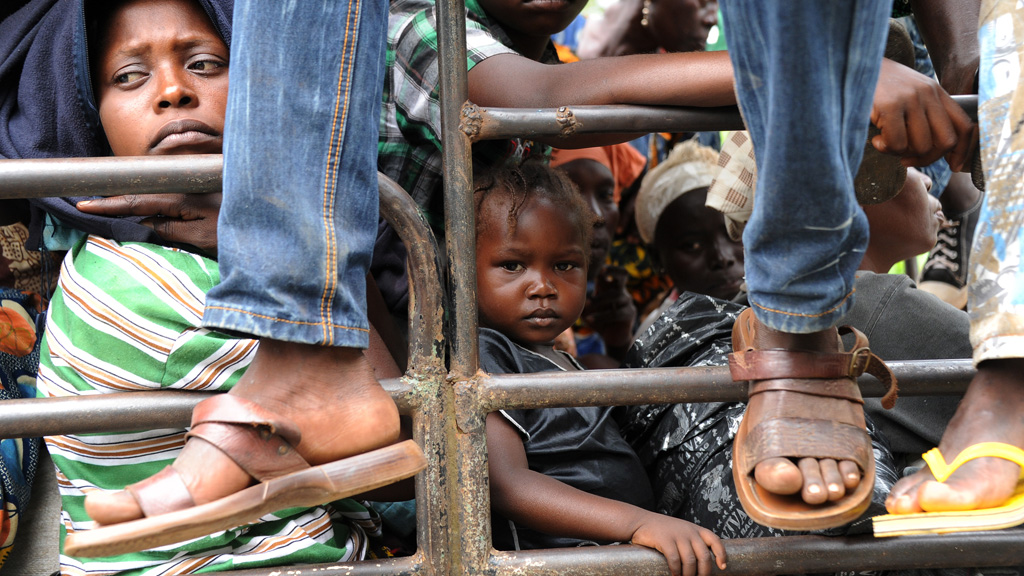
After decades of fighting, violence, starvation and homelessness have become the norm in the Central African Republic where the UN estimates half the population needs humanitarian aid.
The chaos and desperation of the worsening crisis in the country is stark enough when expressed in numbers. Of the 4.5 million population, a third of people face a critical food shortage, 390,000 people have been displaced, one in ten children do not reach their first birthdays.
They visited each household in our village and killed all the adults, including my parents. I had nowhere to go. ‘Sango’
But what the numbers do not reflect is the fear and desolation of the people living in this under-developed, former French colony.
For that you need to hear from the victims.
Six-year-old “Didier” (not his real name) tells how “both my parents have died, so I came to the streets because I was hungry.”
Or another child, “Sango”: “They visited each household in our village and killed all the adults, including my parents. I had nowhere to go.”
An already desperate destitute population is being pushed to the limit. Kristalina Georgieva, EU Commissioner
Or Prophete Ngay-bola, a father of eight children: “We have nothing now. I can’t even go to my house or fields. If they see me there, they’ll kill me.”
The UN says the crisis has affected nearly every member of the country.
Tit-for-tat violence
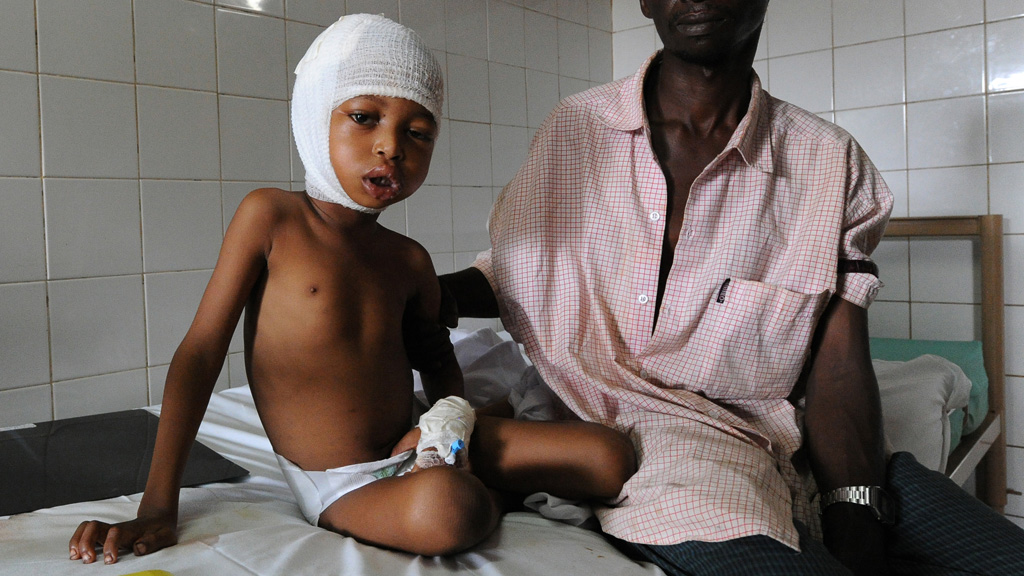
(Above: a child in a hospital bed with injuries from a machete, following the December 2013 attack on Boali.)
This week 12 civilians were shot dead and 30 more injured, including children, in the town of Boali.
Human rights violations are mounting. The use of child soldiers is rising. Sexual violence is growing. Jan Eliasson, UN
Who perpetrated the attack is not clear, but is has been reported to have been carried out by one of the Christian-dominated “defence” groups, known as the “anti-balaka”, which have sprung up to counter the Seleka, a Muslim-dominated alliance of rebel militias.
EU humanitarian chief Kristalina Georgieva said the increase in tit-for-tat killings meant the country faced the twin risk of state collapse and potential genocide. In September, Ms Georgieva wrote of the deteriorating situation:
“killing (including executions), torture, physical violence including sexual violence, extortion and illegal taxation, pillaging and the destruction of houses and fields are affecting the whole life of the country.
An already desperate destitute population is being pushed to the limit. This is clearly unacceptable.”
Decades of instability and fighting in the Central African Republic came to a crescendo in 2012 when a number of rebel groups allied to form the Seleka.
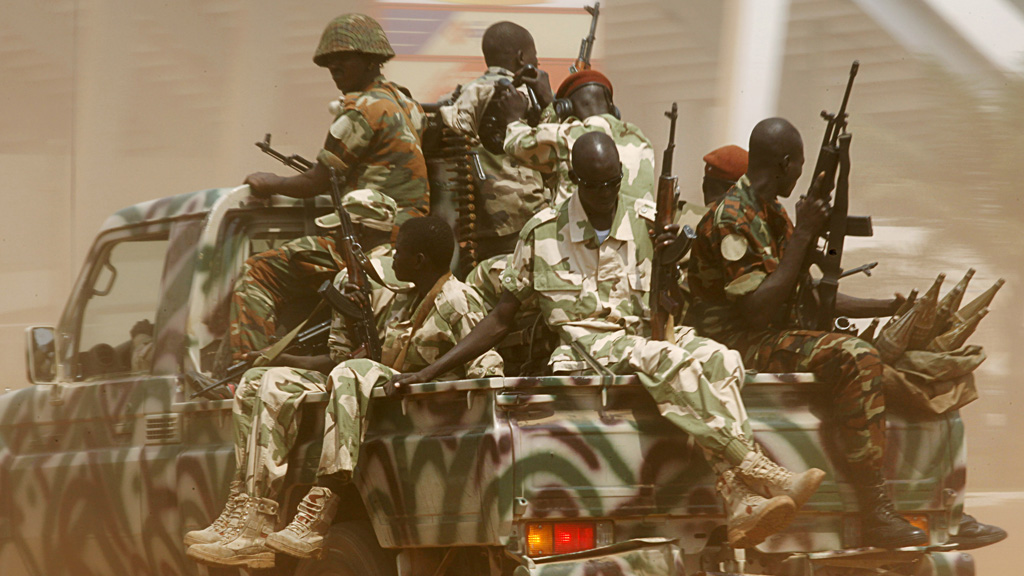
(Above: fighters from the Seleka group, which was supposedly dissolved in September 2013, patrol the Central African Republic’s capital Bangui on 3 December 2013.)
These rebel groups launched a series of attacks across the country, and took control of large areas in December 2012.
On 24 March 2013, after rebels reached the presidential palace in the Central African Republic’s capital Bangui, Seleka leader Michel Djotodia replaced Francois Bozize as president.
The following period was marked by continuing acts of violence and human rights violations, including allegations of rape, killings and looting, which have been largely attributed to Seleka fighters.
In September, President Djotodia declared that the Seleka had been dissolved. This has not ended the violence, with Seleka fighters and anti-balaka still reported to be carrying out atrocities.
What is the impact?
As is common in such conflicts, it is the innocent who suffer the most. “The population is enduring suffering beyond imagination,” UN Deputy-Secretary-General Jan Eliasson said last week.
I might only be a child but I’ve seen what this conflict is. I was part of it. I have seen horrible things; mutilated bodies, arms blown off, bodies without heads, lots of blood. ‘Namboro’
“As we see far too often, women and children are bearing the brunt. Human rights violations are mounting. The use of child soldiers is rising. Sexual violence is growing. There are widespread reports of looting, illegal checkpoints, extortion, illegal arrests and detentions, torture and summary executions.”
Children growing up in the Central African Republic face a number of threats. They can end up fighting themselves. Unicef estimates that armed groups have recruited 6,000 children into their ranks.
Unicef’s country director Souleymane Diabate said: “The ex-Seleka were targeting the population and what we have seen now is the population has started to organise themselves and have these self-defence groups and among these groups we have lots of children.”

(Above: Militia fighters known as anti-balaka pose for a photograph in Mbakate village, Central African Republic, on 25 November 2013.)
Save the Children met with a number of child soldiers earlier this year. One 16-year-old, Namboro, described how he joined an armed group after the “old army” beat up and shot his father.
“He survived but I decided that I wouldn’t take this any more. I wanted revenge and so I decided to join the rebels. They gave me a gun and taught me how to use it.
These living conditions make the displaced people, especially young children and pregnant women, extremely vulnerable to disease. George Georgantas, ICRC
“I might only be a child but I’ve seen what this conflict is. I was part of it. I have seen horrible things; mutilated bodies, arms blown off, bodies without heads, lots of blood.”
He said he had done thing he regretted, but added: “I didn’t have a choice. A soldier does what he is told to do.”
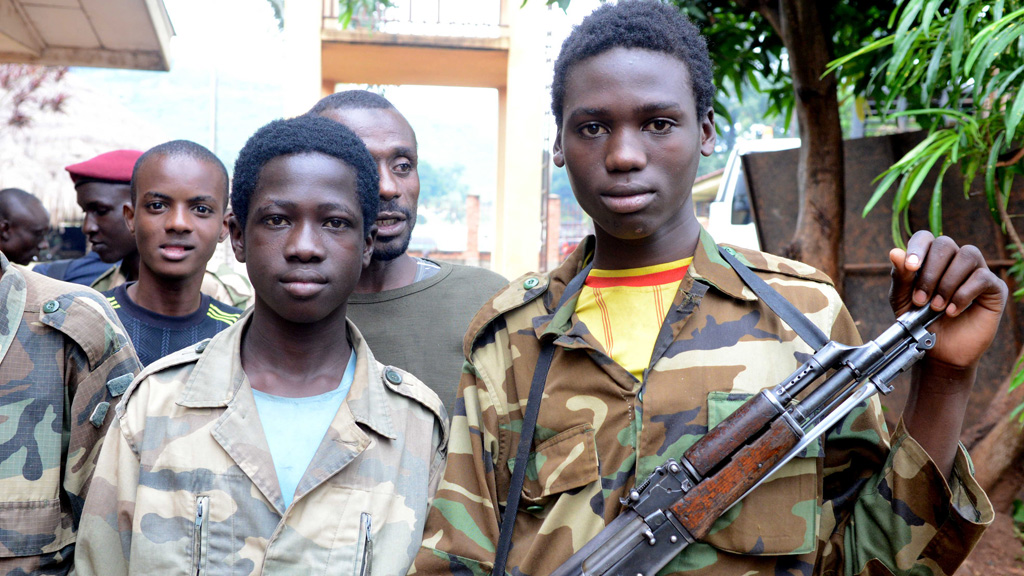
(Above: Young Seleka fighters pose at a Seleka base in Bangui on 25 July 2013.)
Armed groups are also responsible for the killing of children, it has been claimed. Unicef has called for the country’s government to investigate allegations.
Women face the prospect of sexual violence, Amnesty International has reported. Amnesty interviewed women in Bangui who said they had been raped in their homes by Seleka soldiers.
Incidents included a stepmother and two daughters being raped by six soldiers and women being raped in front of children and/or older relatives.
Living in fear
But the citizens of the Central African Republic do not just face death through the barrel of a gun, or pain at the hands of armed men.
A major refugee crisis has been sparked by the violence, with Seleka fighters reported to have rampaged through villages, burning homes and sending people fleeing into the bush. Nearly 400,000 people are displaced, many inside the country.
“The current situation is extremely worrying. People who have taken refuge in the bush often have to drink poor-quality or contaminated water,” said George Georgantas, head of the ICRC’s Central African republic delegation, said.
“Finding something to eat is also a problem for many. These living conditions make the displaced people, especially young children and pregnant women, extremely vulnerable to disease. In much of the country, however, health care is unavailable.”
Peter Bouckaert, Human Rights Watch’s emergency director, visited one of the worst hit areas in the Central African Republic, the Ouham prefecture, where 170,000 people have been displaced.
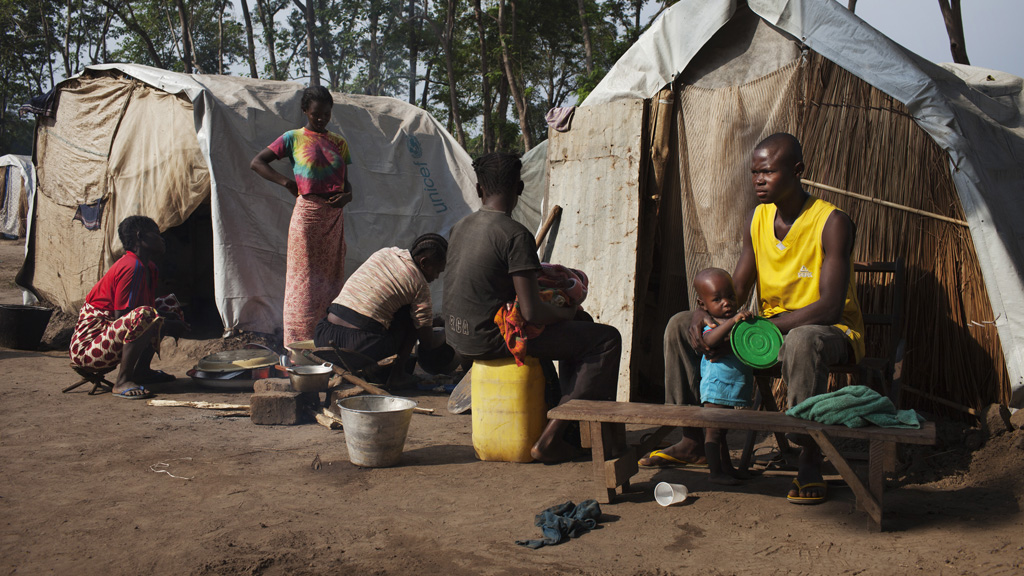
(Above: Internally displaced people in the grounds of the Saint Antoine de Padoue cathedral in Bossangoa, Central African Republic, on 25 November 2013)
He described how people would often mistake the vehicle he was travelling in for a Seleka military vehicle.
“One day, our passage was blocked by the meagre bundles of belongings dropped by a family that had fled into the bush as they heard us approach,” he said.
“We found a toddler crying on the road: his parents had lost him as they ran away.
“When they emerged a few minutes later, after much coaxing, they explained that they had been walking all night to reach Bossangoa, where some 40,000 people are living in dismal, cramped conditions around a Catholic church.
“‘There are so many children dying… from malaria and typhoid fever,’ the exhausted father told us.”
Robust response
The international community is starting to respond to the crisis in CAR. France has begun sending 800 to 1,000 additional soldiers to bolster 2,600 African Union troops on the grounds. On Thursday the Security Council will vote on the French action.
But Salil Shetty, secretary general of Amnesty International, has called for more, saying: “The Security Council must request that the UN Secretary-General immediately start preparations for the deployment of a robust peacekeeping force, with a mandate to protect civilians, including internally displaced persons.
“Troops on the ground must have the resources necessary to stop the ongoing abuses and rein in armed groups and forces that have already spun out of control over the past year.”
“The CAR is a forgotten crisis at the global level,” Mr Diabate says. “While the world is preoccupied with what is happening in Syria or the Philippines, the situation is very tragic.”
The focus will now be on the international community to say if they will, or will not, forget the people of this struggling country.
-
Latest news
-
Taylor Swift’s new break-up album breaks records3m

-
NHS trust fined £200K for failings that led to death of two mental health patients3m

-
Sunak vows to end UK ‘sick note culture’ with benefit reform3m

-
‘Loose talk about using nuclear weapons is irresponsible and unacceptable’, says head of UN’s nuclear watchdog3m

-
‘There wasn’t an Israeli attack on Iran,’ says former adviser to Iran’s nuclear negotiations team7m

-




